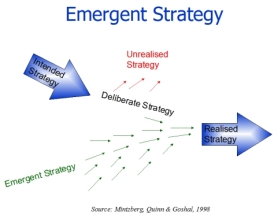 The 1998 paper Mintzberg, Quinn and Ghosal (1998) looked into organisations with and without explicit strategic plans, the effect of this on the staff within the organisation and the ultimate outcome. Importantly, and intriguingly, the principal finding was that the realised strategy of the organisation was not directly related to the intended, deliberate strategy, the precise and explicit plan of the organisation, but more an outworking of the non deliberate and hugely variable strategies of the work force; emergent strategy.
The 1998 paper Mintzberg, Quinn and Ghosal (1998) looked into organisations with and without explicit strategic plans, the effect of this on the staff within the organisation and the ultimate outcome. Importantly, and intriguingly, the principal finding was that the realised strategy of the organisation was not directly related to the intended, deliberate strategy, the precise and explicit plan of the organisation, but more an outworking of the non deliberate and hugely variable strategies of the work force; emergent strategy.
This all sounds very complex until you put it into an analogy, once again I have returned to the football pitch.
The current manager of Albion Rovers is Paul Martin. Before a match he will gather information about his team, the opposition and their usual tactics, possibly even the weather and the referee, to come up with his intended strategy. His team will be briefed with this, given explanations about pressing plays and the mid-field width, the role of wingers and the man to man defence. This deliberate strategy is inculcated into the team right up to the point where they cross the white line.
And then it all falls to bits as Forfar change to the long ball game as the weather turns, worse still four players on the Rovers team get booked and with the midfield failing to deliver their expected dominance, all this brings about the realised strategy of a 4 nil humping the likes of which they haven’t seen for a while.
The manager sets out an intended strategy, the team play out their own individual strategies, some in the knowledge and direction of the manager’s deliberate strategy, some not, and the realised outcome is a combination of all these; emergent strategy.
Sadly, the reality wasn’t what was the intended strategic goal!
